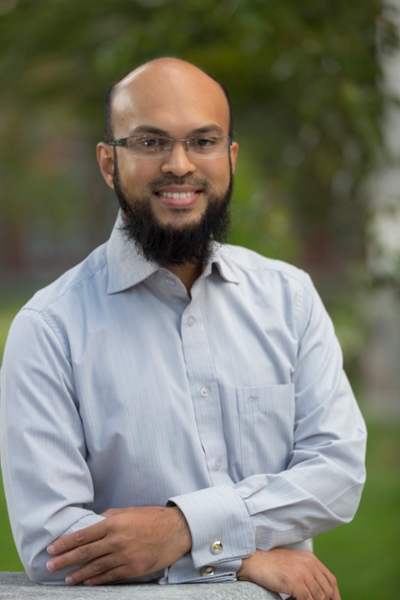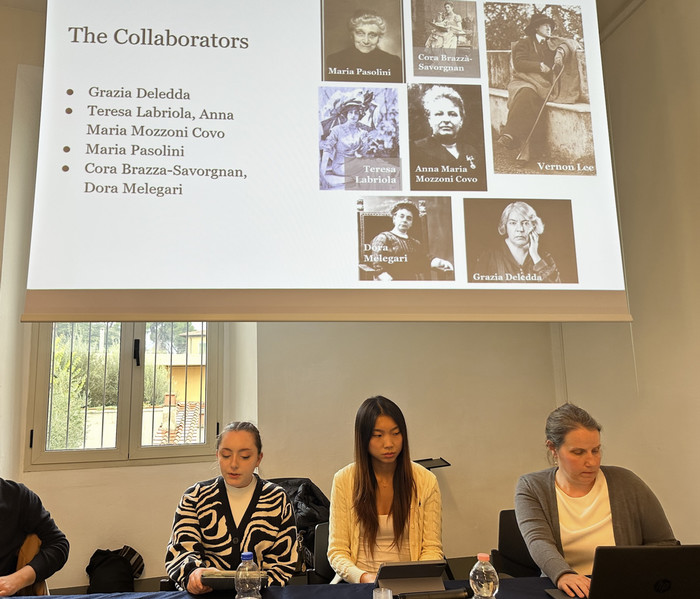How Does Our Social Network Influence Our Behavioral Choices?
By Tom Porter“No man is an island” wrote the poet John Donne in 1624, meaning whether we like it or not, we are all connected. It’s an assertion that rings truer than ever in today’s networked world, and a it’s a central theme of the research currently being done by computer scientist Mohammad Irfan and his colleagues.

Assistant Professor of Digital and Computational Studies (DCS) and Computer Science (CS) Irfan recently helped to secure around half a million dollars in funding for an exciting multiyear project exploring human interactions in networks. The research could have implications for many fields, he says, from public health to energy pricing to finance to the analysis of congressional voting patterns.
The award was made by the National Science Foundation (NSF)* and done in collaboration with Luis E. Ortiz of the University of Michigan—Dearborn, for a multiyear research initiative. It's all part of a core NSF program called Information and Intelligent Systems, says Irfan, who is the project director (while Bowdoin is the lead organization.)
The project, titled “Influence Games: A Game-Theoretic Approach to Strategic Behavior in Networks,” falls within the field of computational game theory, he explains. “It’s a relatively new branch of AI [artificial intelligence] studying strategic interactions among multiple agents. Here, ‘strategic’ means how one's action or behavioral choice affects others' choices and vice versa. One simple example is influence in social networks, where individuals impact each other’s behavioral and lifestyle choices, like smoking, eating healthy, etc. We may ask, ‘Who are the most influential smokers in the sense that if they quit smoking many others would be influenced to quit smoking?’”
The aim of the project, says Irfan, is to devise models, algorithms, and computational tools that are general enough to be applied to a variety of strategic scenarios. “The US Congress is another good example, where we can ask how the network of influence among legislators is impacted by the bill context and how this network has changed over time. ‘Who are the most influential senators for passing a finance bill?’ we may ask.
“In public health, our tool may help policy makers in selecting a handful of individuals in a social network with the goal of reducing smoking or obesity. This is commonly known as the ‘minimal targeted intervention’ problem. In up and coming systems like smart grids, one's decision on electricity usage impacts others' decisions (due to the dynamically changing price). Our research may help achieve a desirable social outcome by identifying households whose electricity usage is crucial to the system. Yet another application area is microfinance, where we may ask similar questions on influencing its adoption.”
Central to all of these examples, says Irfan, is the recognition that the world is becoming increasingly interconnected. “While not all connections have the same level of importance or even the same meaning, these connections nevertheless play a crucial role. Our research seeks to model how networked individuals influence each other in their decision-making and what collective outcomes may arise from such a system of influence.”
"The US Congress is one good example, where we can ask how the network of influence among legislators is impacted by the bill context and how this network has changed over time. 'Who are the most influential senators for passing a finance bill?’ we may ask."
Irfan describes himself as “super excited” about the award, which he says will have a positive impact on his students. “On a personal note, I feel like I'm surrounded by amazing colleagues in CS, DCS, art history, math, you name it, who are phenomenal scholars and serial award winners. They inspire me to be like them.” As for his students, Irfan says no award would have been possible without their research, which was specifically cited by the NSF panel. “Going forward, the award will provide many scholarship opportunities. I'm also planning to take a few students to major AI conferences where they'll get to see the vastness of the subject and the limitless opportunities it offers.”
He plans to incorporate research results from this project into two of the courses he’s teaching this semester, Computational Game Theory (CSCI 3210) and Social and Economic Networks (CSCI 2350/ DCS 2350), as well as one upcoming DCS course titled Contagion. “I feel like the teacher-scholar faculty model of Bowdoin sets the right tone for integrating research into teaching,” he says. “This obviously helps students get a sense of what’s beyond the textbooks. More importantly, it gets them excited about research, and with the exceptionally talented students we get at Bowdoin, I’m confident and enthusiastic about this project.”
*NSF Award No. 1910203.



